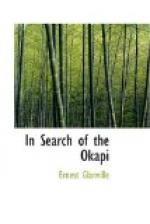“The people dealt well by their white man. They gave him food; they carried water for him, and built his fire. Even I, as a child, carried wood to him and listened at his knees.”
“I am not blaming the people; but I want to find the place that is called the Place of Rest, where my father lived; perhaps where he died.”
“This, then, is the hunting?” said the chief, softly.
Mr. Hume recognized the suspicion in the altered tone and suave manner of the chief.
“We have spoken,” he said sharply. “We go into the forest to hunt and to seek without anger against any. We thought you would have worked in well with us; but I see you are a man of a crooked mind.”
“Softly, my father,” said the chief, quietly. “Is it wise that a chief should listen to the counsel of strangers without taking thought for his people?”
“We saved the chief’s life.”
“The chiefs life is his own”—Muata snapped his fingers—“but the secret of the hiding-place is the life of the people. Go slowly, my father. Muata would work for you and with you; his shield is your shield; his eye is your eye; but the secret of the hiding-place is not his to give away.”
“Then you must land here on the bank among your enemies.”
The chief glanced at the far-off wooded banks, with lines of smoke rising from cooking-fires.
“I have no weapons,” he said.
“We cannot help that,” said Mr. Hume, with indifference. “Either you agree to take us to the Place of Rest, or you land.”
Muata rose up, looked under the flat of his hand all around, then let the cotton sheet they had given him slip to the deck. The jackal started up, with his ears pricked and his eyes fixed on his master’s face. The chief caught hold of a wire rope and jumped on to the rail, where he steadied himself.
“What will you do?” asked Mr. Hume.
Muata turned round and pointed to the otter on his chest.
“You don’t mean to say,” said Venning, indignantly, “that you are going to let him swim ashore? Why, the bank is miles away, and the crocodiles are in between.”
Muata’s glance fell on the jackal, and he spoke to it. The animal whined, then crouched.
“A favour, my father,” he said. “If the beast followed me, he would be food for the crocodiles. Place him on land when you reach the bank, for the sake of good hunting.”
“I will do so.”
The chief took another long glance around, then drew himself up for the dive.
“Stop,” said Mr. Hume.
Muata looked round.
“Your shield is our shield. So be it. We will not ask you to lead us to your hiding-place. Is that so, Compton?”
“When he leads us,” said Compton, nodding his head, “it will be at his own will.”
“At any rate,” muttered Venning, “he has proved himself to be a man; but I wonder if he would have reached the shore?”




